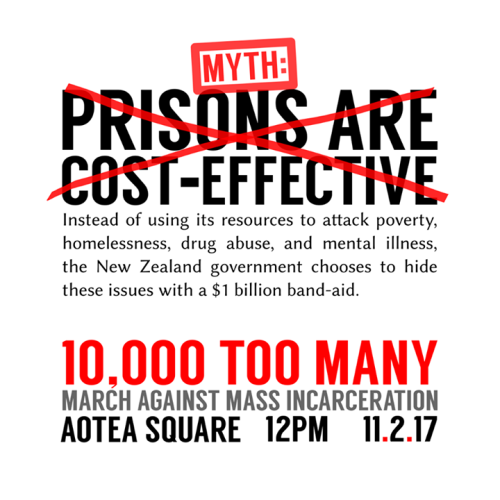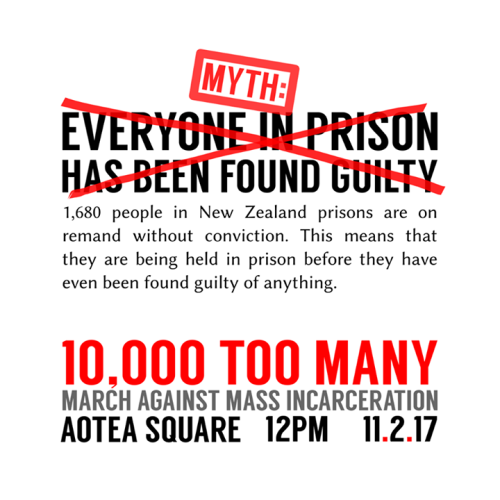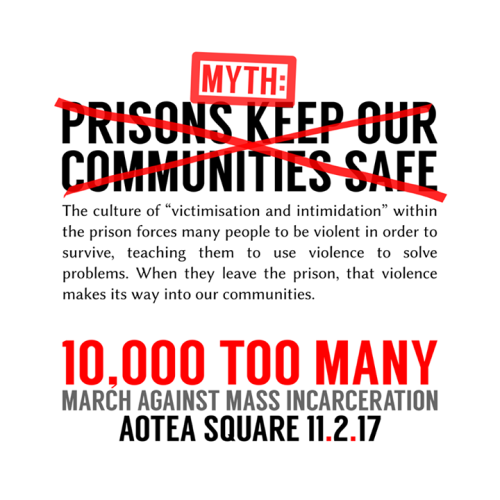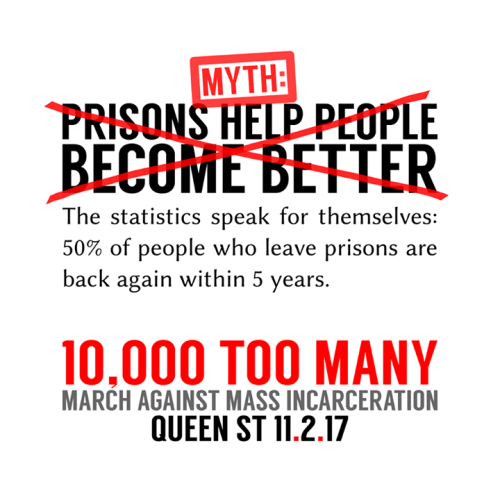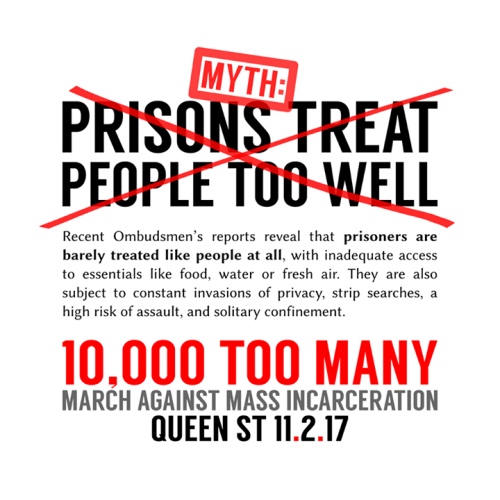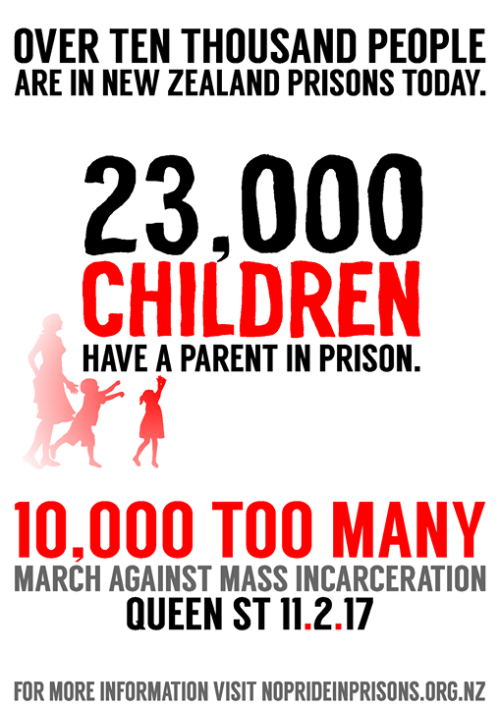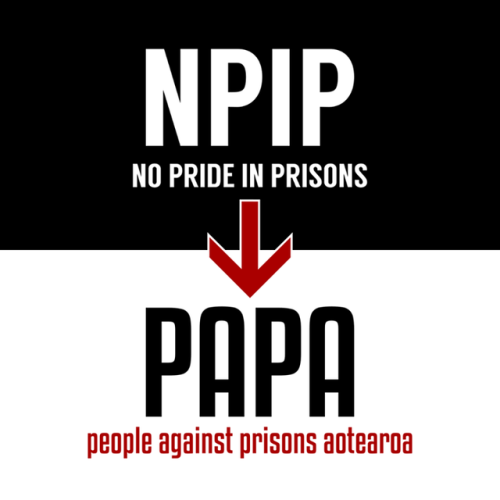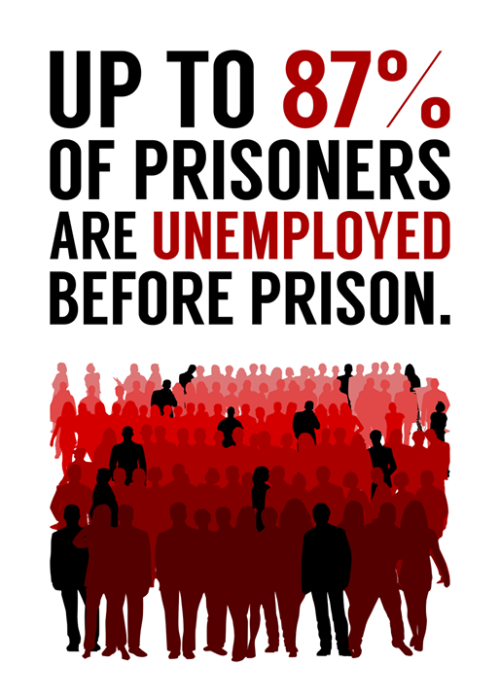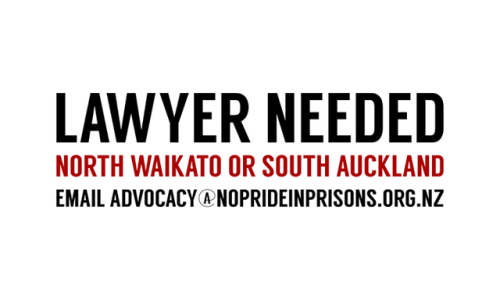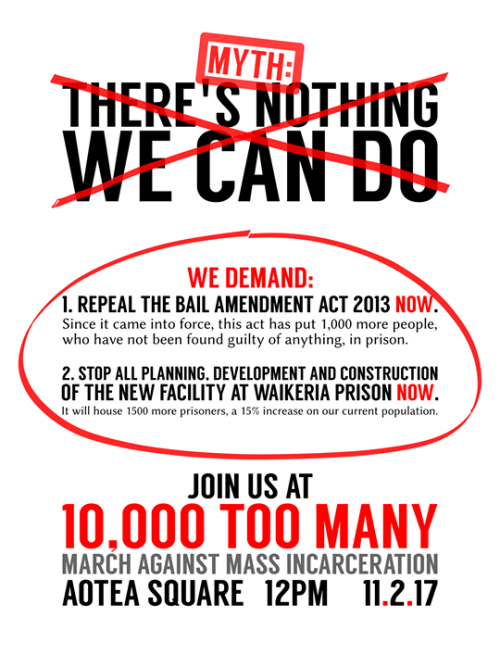#no pride in prisons
MYTH: “PRISONS ARE COST-EFFECTIVE”
In 2017, the New Zealand government has budgeted $1 billion for the running of prisons, as well an additional $1 billion for prison construction and expansion over the next few years. What could this money do for impoverished communities across Aotearoa? For the 23,000 children with a parent in prison? For education? For housing?
While the government eagerly increases its spending every year on an unjustifiably cruel system, it ignores the widespread poverty in New Zealand that drives people into criminalised activity. The prison population could be drastically reduced by dealing with fundamental problems in society, such as inequality and racism. Instead of using its resources to attack poverty, homelessness, drug abuse, and mental illness, the New Zealand government chooses to hide these issues with a $1 billion band-aid.
Prisons fail to provide a real solution to our social problems – they address misery and hardship by creating even more misery and hardship. http://ift.tt/2jHQODk
Post link
MYTH: “EVERYONE IN PRISON HAS BEEN FOUND GUILTY”
1,680 people in New Zealand prisons are on remand without conviction. This means that they are being held in prison before they have even been found guilty of anything. The recent “tough on crime” reforms, such as the Bail Amendment Act 2013, have made this even worse. Between September 2013, when the bill was introduced, and September 2016, 77.49% of the increase in the prison population was due to a rise in the number of people being held on remand.
This increase in the prison population, now at 10,000, has created an overcrowding crisis. This crisis has been used to justify housing multiple people in tiny cells and denying them access to fresh air. Right now, it is being used to justify the building of a new facility at Waikeria Prison, which will house 1,500 more prisoners. Since this bill came into effect, the remand population alone has increased by more than 1,000 people!
The current overcrowding crisis is the result of a cruel piece of government policy. While the New Zealand Bill of Rights Act states that a person must be presumed innocent until proven guilty, 1,680 prisoners are being punished as though they had been found guilty anyway. The government now wants to justify degrading and torturing 1,500 more prisoners with this blatant breach of human rights! This is unacceptable. We demand the repealment of the Bail Amendment Act. http://ift.tt/2kmNt9C
Post link
MYTH: “PRISONS KEEP OUR COMMUNITIES SAFE”
Prisons target specific communities much more than others. Those who are imprisoned are more likely to be poor, Māori, mentally unwell, and intellectually disabled. Māori experience discrimination at every stage of the criminal “justice” system, and are more likely to be apprehended, prosecuted, convicted, and sentenced to prison. Māori make up only 15% of the total New Zealand population but over 50% of the prison population.
In what way are these communities being kept safe when parents, children, whānaunga, lovers, friends, caretakers and wage-earners are being locked in a cage away from their communities and tortured?
In fact, prisons actively endanger these communities. It has been found that those who leave prison often come out more violent than before. People who go to prison for non-violent offences are much more likely to commit violent offences when they leave. The culture of “victimisation and intimidation” within the prison forces many people to be violent in order to survive, teaching them to use violence to solve problems. When they leave the prison, that violence makes its way into our communities.
Former prisoners are also much more likely to be homeless and unemployed. As a result, people who have been in prison and their whānau are left with not only emotional and physical damage, but also an increased likelihood of being poor. Families that have or have had a member in prison face a vicious cycle of poor health, poor education, inadequate housing, and mental illness, which leads to more members of their community being imprisoned!
These families are caught in a cycle of misery that prisons help to reproduce over and over. Prisons not only fail to keep communities safe, but actively contribute to making communities unsafe by creating widespread fear, violence, homelessness and impoverishment. http://ift.tt/2ks01iB
Post link
MYTH: “PRISONS HELP PEOPLE BECOME BETTER”
In light of these inhumane conditions, we must ask: how does exposing people to fear, assault and isolation make them better people? Does this really teach people who have hurt others how to change? And if Corrections believes the way to keep the most vulnerable prisoners safe is to lock them in solitary, effectively exposing them to yet another form of torture, are prisons not just punishing people for the sake of punishing them?
The statistics speak for themselves: half of people who leave prisons are back again within 5 years. When people do find rehabilitative services in prison useful, their personal development isn’t because of imprisonment but in spite of it. None of the services provided to prisoners require them to be imprisoned in order for them to be successful. People come out of prison scarred, not healed. http://ift.tt/2jSkT18
Post link
MYTH: “PRISONS TREAT PEOPLE TOO WELL”
Recent Ombudsmen’s reports have revealed that prisoners are not even treated adequately, let alone well. They have found that the drinking water in some New Zealand prisons is discoloured, and that some prisoners are not even provided with drinking cups. Prisoners usually have their final meal of the day at 4pm, meaning that it is common for them to go 16 hours without any food.
The Ombudsmen have also discovered that many prisoners are put in double-bunked cells far too small to accommodate two people; many do not get daily exercise or fresh air; many prisoners have to eat their meals next to an uncovered toilet; and many prisoners do not have regular access to clean clothing and sheets.
The reports have uncovered that prison staff are able to watch some prisoners, even in their most intimate moments – getting dressed, using the toilet, and washing themselves. This is supposedly done in the name of safety, but instead makes prisoners feel degraded.
Every prisoner is also required by law to be strip searched when they enter and leave the prison, as well as on many other occasions. During a strip search, officers have full authority to invade the prisoner’s body, including “lifting and raising” their “fat, genitalia, and breasts.” Despite how invasive this is, nothing is found in 99.59% of strip searches. Strip searches amount to senseless sexual assault and nothing else.
Although strip searches are supposed to prevent harm, the Ombudsmen have nonetheless found an extremely high level of unreported prisoner-on-prisoner assaults. Many prisoners feel unsafe going about their everyday lives in prison. Referring to both other prisoners and prison staff, many prisoners describe the culture of the prison as one of “victimisation and intimidation.”
Those who are most at risk of this violence are often placed in conditions akin to solitary confinement, where they may be stuck in their cell for up to 23 hours a day and cut off from contact with others.
These conditions have been defined as a form of degrading treatment according to the United Nations Convention Against Torture. This reveals that not only are prisoners not treated “too well,” but that they are barely treated like people at all.
http://ift.tt/2kkG2lDhttp://ift.tt/2jwD8WD
Post link

Members of prison abolitionist organisation No Pride in Prisons will be joining the Tāmaki Housing Group today to resist the eviction state housing tenant of Ioela “Niki” Rauti.
Its spokesperson Emilie Rākete says, “No Pride in Prisons is proud to join our friends and whānau in protecting Niki’s right to a home. We will be joining dozens of others in occupying Niki’s land and refusing to move until she is guaranteed the right to stay in her home.”
Rauti was served with a 90-day eviction notice, which expired on the 18th of January. The police has warned that she will be physically moved on today from 9:30am. “We intend to put our bodies on the line to stop this eviction,” says Rākete.
No Pride in Prisons believes the eviction is unjust. “One of the most frustrating things about this whole process is that it never used to be like this. State housing tenants, including Niki, were told for decades that their houses were for life.”
“The government introduced reviewable tenancies just so it could kick out state housing tenants and make some money from their eviction.”
Rauti’s house is owned by the Tāmaki Regeneration Company (TRC), which was transferred ownership from Housing New Zealand as a part of the Tāmaki redevelopment. TRC wants to develop the land that her house sits on.
“While the government and the council say these evictions are necessary to keep house prices down, we’ve seen a huge increase in house prices in the area since the redevelopments began.”
“The government is effectively kicking out old and poor people and making room for the rich. Niki’s eviction is just one part of a broader plan to undermine state housing and transfer land to the wealthy,” says Rākete.
The organisation is worried about how the move might impact Niki’s health and well-being. “Niki is an elderly woman who has a heart condition. One of the saddest parts of the Tāmaki redevelopment has been the effect on the elderly. Often, following eviction from life-long homes, elderly tenants have passed away shortly after being relocated.”
No Pride in Prisons is also concerned about the police involvement in evicting Niki. According to Rākete, “The police will do everything it can to make sure that this blatantly unjust process continues. Niki is a respected kuia, but the police intend to remove her from her home by force.”
“We oppose both Niki’s eviction and the violence we expect to see from police in order to make it happen.”
“We believe that Niki and all other tenants deserve healthy, warm and affordable homes, and the stability of knowing they won’t be evicted every time the government wants to make a buck.”
“We support the Tāmaki Housing Group and all those resisting the sell-off of state houses and the eviction of state housing tenants. This injustice is part of a broader program by this and previous governments to undermine support for poor and working class people.”
“No Pride in Prisons stands in solidarity with those fighting for safe and secure housing for all.”
On the 11th of February No Pride in Prisons, alongside other organisations across the country, will be holding a march against expanding prisons, overcrowding, and the unjust punishment system! The prison population in Aotearoa has just reached 10,000 for the first time. The recent Ombudsman’s reports have revealed that prisoners are exposed to constant threats of violence and subjected to practices that amount to torture. There is no reason to keep locking more people away from their loved ones in inhumane conditions. It doesn’t help them become better people, and it doesn’t keep their communities safe. The government has continued to ignore the growing evidence that prisons don’t do what they’re supposed to. Over the next few years, $2.5 billion worth of prison construction and expansion has been planned, including a new prison in Waikeria. This year, the New Zealand government budgeted one billion dollars for the Department of Corrections. What could one billion dollars be doing for impoverished communities across Aotearoa? For the more than 20,000 children with a parent in prison? For education? For housing? For the 1,000 people who are going to be put in Waikeria? It is clear that at this point the government cannot justify its commitment to the existing prison system. This is nothing more than incarceration for incarceration’s sake, and it is unacceptable. We believe that all of us have a reason to oppose the locking up of 10,000 people away from their communities. We invite you to come to 10,000 Too Many, a march against mass incarceration. We’d really like to see you there! EVENT LINKS: FACEBOOK: https://www.facebook.com/events/1295188543879616/ EVENT SITE: https://sites.google.com/view/10000toomany/home
Post link
On the 1st of September 2017, No Pride in Prisons (NPIP) changed its name to People Against Prisons Aotearoa (PAPA). We made this decision to better reflect the fundamental purpose of the organisation. It marks the next step in our commitment to building the prison abolitionist movement in Aotearoa.
No Pride in Prisons started organising in 2015, when it was announced that Auckland Pride had invited uniformed Police and Corrections Officers to march in the Pride Parade. Several of our founding members decided to protest this decision by interrupting the parade. We could not allow the Auckland Pride Board to turn a blind eye to the fact that police and prisons are deeply violent, inhumane institutions. Our aim was to contest the claims by the New Zealand and Department of Corrections that they were now “queer-friendly.” We showed that they can never be “queer-friendly.”
Our original name, No Pride in Prisons, reflected our initial focus on combatting pinkwashing, which we defined as “the promotion of mainstream ‘gay rights’ by corporate or political entities as a veil to excuse or hide unethical practices, particularly where those practices ignore basic human and workers’ rights.” Our protest at Pride forced open a conversation about how queer and trans people were being treated by organisations that outwardly claimed to support them.
We also brought attention to the way pinkwashing weakens the left. The appropriation of queer and trans struggles by oppressive institutions and corporations sends the message that queer and trans people are okay with their exploitative practices. This can undermine the bonds of solidarity between queer and trans people and people fighting these exploitative practices.
In 2016, three hundred people brought the Pride Parade to a halt for an hour and a half. They were voicing their anger at the Police and the Department of Corrections using Pride as a PR stunt for the second year in a row. This action demonstrated the power of collective action, forcing the queer community to reevaluate our relation to these violent institutions. Forcing the Police and Corrections out of the Pride parade publicly reasserted the humanity of prisoners.
Although we were, at first, most known for our protests at Pride Parades, we do much more as an organisation. In 2016, we began to run social programmes and advocate for prisoners on a day to day basis. We also began to put direct pressure on Corrections when they were not meeting prisoners’ basic needs. In November last year, four No Pride in Prisons organisers were arrested for occupying a Corrections office to demand that a trans prisoner be moved out of solitary confinement.
Our day-to-day work was always grounded in the understanding that the best way to support prisoners is to free them from the system that causes their suffering in the first place. We understand that prisons are inherently violent, degrading, and racist institutions. As long as prisons continue to exist in Aotearoa, there will always be more people to help and more cases of abuse.
However, it became increasingly clear to us that, in order to achieve our long term goal of abolishing prisons entirely, it no longer made sense to focus just on queer and trans prisoners. Although queer and trans people certainly experience some of the worst excesses of the prison system’s violence, such violence is also experienced by people from many other walks of life. The queer and trans community cannot abolish prisons just by ourselves or just for ourselves. We came to the conclusion that the prison abolitionist movement we want to see in Aotearoa must include as many people as possible. In particular, it is essential that this movement involves as many currently and formerly incarcerated people as possible, most of whom are not queer or trans.
In February 2017, we opened up our membership to anyone who agreed with our kaupapa, and began to consciously reorient ourselves towards working for all prisoners. This began with our 10,000 Too Many march to Mt Eden Prison, in response to the news that New Zealand’s prison population had just reached 10,000 people for the first time. This record represents a new era in New Zealand’s epidemic of mass incarceration.
The march received huge support from people of many different backgrounds, confirming to us that everyone has a reason to oppose the violence of prisons. Further, it confirmed that there was an urgent need for a mass-based organisation to fight it.
As an organisation no longer exclusive to queer and trans members, and with pinkwashing no longer an emphasis in our organising, the name No Pride in Prisons became increasingly confusing and inappropriate. Many of the previously and currently incarcerated people we reached out to, who were not queer or trans, were hesitant about our name. Removed from its original context, the “Pride” reference does not hold, and the name is (understandably) often taken to mean something like “prisoners should be ashamed.” That the people we recognise as absolutely essential to our movement were sometimes put off by our name was a sign that it was becoming an obstacle to our organising. In the interests of clarity, and of better reflecting our new direction, we began discussing a name change. We arrived at People Against Prisons Aotearoa (PAPA).
As an acronym, PAPA serves as a reminder of this organisation’s commitment to the struggle for mana motuhake. The prison system in Aotearoa has been used to enforce and maintain the racist oppression of Māori. Papatūānuku, the most ancient ancestress of all humans, is a guarding and nurturing force in all our lives. We bear her in mind while we go about the revolutionary task of dismantling the prison system.
Our new name, People Against Prisons Aotearoa, better reflects our ultimate goal of seeing the unqualified abolition of prisons in Aotearoa. We are people against prisons, and we are people for each and every prisoner. We are more committed to this now than ever before.
Information released to No Pride in Prisons under the Official Information Act shows that up to 87% of prisoners were unemployed before entering prison. On the other hand, the unemployment rate across all of New Zealand is 4.8 percent.
This only further proves what we already know: poor people go to prison. The everyday misery of poverty puts people in extremely desperate positions to make ends meet. The stress breeds addiction, health issues, and abuse that tear apart communities.
We also know that Māori make up the majority of people who end up in prison, and are more likely to be poor. Economic racism and colonisation put Māori at even greater risk from the severe harms of imprisonment.
Capitalism is based on an elite class benefiting from the poverty, unemployment and misery of the many. By keeping wages and benefits low, the government ensures that there will always be people desperate to accept bad working conditions.
When people act out as a result of their miserable conditions, they are used as a scapegoat. They are held responsible and put in prison, while the social system that pushed them into prison is ignored.
Prison never has and never will be used to address “crime”. It is used to lock up poor people and secure the privilege of the elite. The prison props up capitalism and colonialism at the expense of Māori and the poor. http://ift.tt/2uvyDBT
Post link
Kia ora whānau,
A prisoner that we work with has come into some trouble and needs a lawyer.
He was recently assaulted by another prisoner at Spring Hill and had to defend himself. Although he tried to resolve the conflict without violence, Corrections has decided to charge him.
He feels that this is extremely unjust. He would like a lawyer present at his disciplinary hearing, to help him make his case.
This is beyond the scope of what our volunteer advocates can do. We need some help getting him representation.
If you know any lawyers in Northern Waikato or South Auckland who’d be keen to help out pro bono, please point them in our direction!
Email us at [email protected] or contact us here on Facebook. http://ift.tt/2wvhlX0
Post link
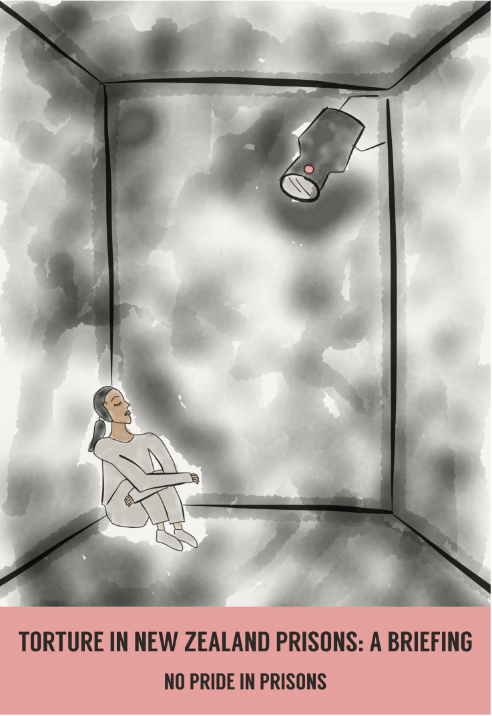
No Pride in Prisons is pleased to announce its new booklet, Torture in New Zealand Prisons: A Briefing.
Check out the blurb:
This booklet draws together the findings of reports made by the Office of the Ombudsman in its investigations of four New Zealand prisons. Using these reports, No Pride in Prisons researchers provide an account, in plain language, of the ongoing abuse and mistreatment of prisoners. Contextualising this information within historical trends, they also tell the stories of prisoners who have contacted No Pride in Prisons, reminding us how this treatment is a lived reality for far too many people. Together, these accounts demonstrate the disturbing but undeniable existence of widespread torture in New Zealand prisons.
Copies of the booklet can be found online for free here, and hard copies can be purchased for $5 by emailing [email protected].
The government has only one response to the booming prison population: more prison beds. Over the next few years, it plans to expand prison capacity by 1,800. The main way it will try to do this is by building a whole new prison on the same site as the existing Waikeria Prison. That prison would be the largest in New Zealand, housing more than 1,500 people.
The government’s response is absolutely futile. It impotently locks away people who have committed crimes, unwilling to address the social problems which cause crime itself. Instead of dealing with the fundamental inequalities, it abandons thousands of people to a prison system that is riddled with violence. Prisons subject very vulnerable people to an environment that makes them more mentally unwell, more likely to attempt suicide, and more likely to be sexually assaulted. Increasing the prison capacity increases the total number of people who will become victims of the violence of prisons.
Building more prisons also costs billions of dollars. Those are billions of dollars that could be spent on education, housing and healthcare. Instead of building more prisons, the government could be spending money on healthcare services for people who struggle with mental illness and drug problems. It could be addressing the drivers of crime, especially entrenched poverty and unemployment.
To make matters worse, the land that the new prison would stand on was stolen from the Ngāti Maniapoto hapu Ngāti Kaputuhi. In 1910, the Governor-General stole by proclamation the land known as the “Tokanui Block”. This land included Ngāti Kaputuhi’s marae Waiaruhe. As Te Runanga o Ngati Maniapoto notes, “Kaputuhi have been displaced from their lands for well over 100 years while corporate shysters enrich themselves by the cultural genocide of Ngati Maniapoto hapu.” We support the right of Ngāti Maniapoto and Ngāti Kaputuhi to mana motuhake over their rohe. We oppose the construction of the new prison at Waikeria, and support returning the land that it sits on.
If the government’s only solution to the overcrowding crisis is to build capacity, we suggest another solution. Instead of building more prisons in response to increasing numbers of prisoners, we should be reducing the number of prisons. As we have argued elsewhere, the overcrowding crisis is caused by a change of policy that meant more people on remand ended up in prison. We can significantly reduce the number of people in prison by demanding the repeal of this policy.
Rather than building another prison at Waikeria, the land should be returned to Ngāti Maniapoto. Rather than increasing the prison population, we must do everything we can to reduce it. Action is needed now to make this happen. In the coming months and years, the movement to stop the Waikeria prison expansion will require your involvement. That starts with the 10,000 Too Many hīkoi on the 11th of February at Aotea Square in Auckland. Your action is needed now to stop the government from spending billions of dollars on new prisons. We have to stop this prison construction project now. Not one more cell!
By Ti Lamusse and Emilie Rākete

New Zealand’s prison population hit a record 10,000 for the first time in November2016. New Zealand has never had more people in prison than it does today. This booming prison population, and the overcrowding crisis it has caused, did not happen by accident. It did not happen because of increasing crime rates.[1] It did not happen because cops are catching more “bad guys”. It happened because the government just decided to imprison more people.
On September 4, 2013, the Bail Amendment Act came into effect. The purpose of this law is simple: to lock up more people on remand. Remand is the period of time between being charged with something and being sentenced. The majority of people imprisoned on remand have not been found guilty of anything and may never be found guilty. The law made it much harder to get bail, which has led to many more people being remanded in prison.
According to data I’ve collated between December 2013 and December 2016, the remand population has skyrocketed since the Bail Amendment Actcame into effect. Before the new law, the prison population was actually falling for the first time in decades. Since the law came into effect, the prison muster has increased by about 1,700 people, an increase of 20.6%. This has been almost entirely due to an increase in the remand population. The number of people in prison on remand alone has risen by more than 1,200, a 78.4% increase.
These law changes haven’t affected all parts of the prison population equally. The changes have disproportionately impacted women and Māori prisoners. The women’s prison population has increased at twice the rate of the men’s prison population. The number of women on remand has more than doubled, now 112.4% higher than it was before the Act came into effect.
While both Māori and Pākeha prison populations have increased substantially over the past three years, the Māori prison population has grown about one and a half times faster than the Pākeha prison population. There are approximately 900 more Māori in prison since this law came into effect, increasing by about 22%. The majority of the increase in the prison population has been Māori, and Māori now make up a larger percentage of the total prison population than three years ago.
More people are now being imprisoned for poverty-related offences of dishonesty, which includes solo mums who are convicted of ‘benefit fraud’ just for trying to put food on the table for their kids.[2] While the Bail Amendment Act isn’t the sole cause of New Zealand’s astounding imprisonment rate, as we were already locking up a ridiculous number of people before it, it has contributed to a massive increase in the prison population. This has led to more poor people, women and Māori in prison than ever before, making this law a racist, sexist law that serves the interests of the rich.
The Bail Amendment Act needs to be repealed immediately. Although there are many drivers behind New Zealand’s booming prison population, including harsh parole and racist drug laws, the repeal of the Bail Amendment Act is the first step toward undoing the worst of the violence of prison overcrowding and mass incarceration. This government policy will not be changed on its own. It requires a groundswell of people who are willing to say that they’re not going to put up with this any more. You can be a part of this movement. Join us at noon on February 11 at Aotea Square for the 10,000 Too Many hīkoi. We will be demanding the immediate repeal of the Bail Amendment Act and an end to the injustices it has produced. Make your voice heard now. Stand up for justice and demand the repeal of the Bail Amendment Act.
By Ti Lamusse

[1] Crime rates are lower than they were three years ago.
[2] As the Child Poverty Action Group notes, ‘benefit fraud’ is a broad category that is used to criminalise solo mothers, regardless of whether they intended to commit ‘fraud’ or if the ‘fraud’ occurred because of bureaucratic incompetency.
MYTH: “THERE’S NOTHING WE CAN DO ABOUT IT”
The New Zealand government has put $1 billion into expanding our prison system in the next few years. Much of that money hasn’t been spent yet, with the construction of new facilities like the one at Waikeria only being scheduled to start in 2018. That’s $1 billion that could be saved if we make it perfectly clear that enough is enough and we will not put up with pouring any more money into this broken system. More importantly, that’s over 1,500 people who might escape the horrors of imprisonment.
2017 is an election year, and no matter what happens, it will be a year of political shake-ups and new leadership. Now is the time to act and make clear that the enormous human and financial waste that is our prison system is unconscionable and cannot continue.
Our demands are:
1. The immediate repeal of the Bail Amendment Act 2013. Since it came into force, this act has put 1,000 more people who have not been found guilty of anything in prison.
2. The immediate end to all planning, development and construction of the new facility at Waikeria Prison, which will house 1,500 more prisoners.
We believe that all of us have a reason to oppose the imprisonment of 10,000 people. We invite you to march with us on Queen Street, on February 11, 2017 at 12pm. Help us to make it known that we will not accept the government’s reckless disregard for people’s lives. With the prison population at a record high of 10,000, and the government planning further expansion, we must make our voices heard now. Urgent action is required to stop all the injustices of mass incarceration.
How many are suffering unnecessarily? 10,000 TOO MANY!
How many more will we leave to this fate? NOT ONE MORE! http://ift.tt/2kgHX7w
Post link

